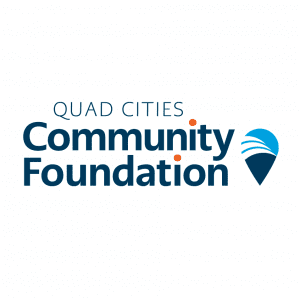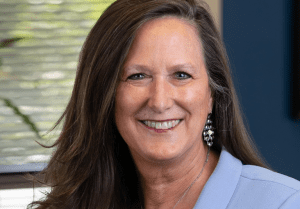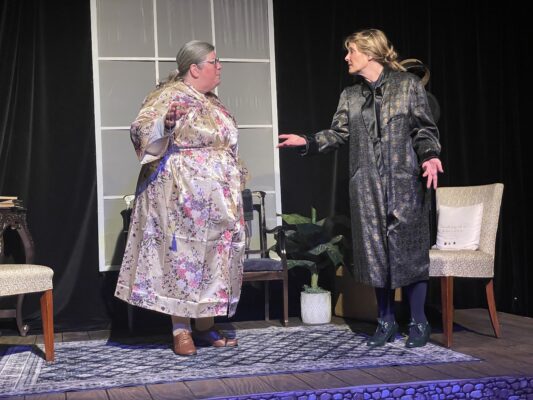Quad Cities Community Foundation Gives Out $200K, Names New Board Chair
Improving equity is a major priority on the national and local level, and the Quad Cities Community Foundation continues to make big strides in the effort.
It recently awarded two $100,000 transformation grants to help bring equitable solutions to the bi-state region, and the nonprofit’s new

The Community Foundation recently gave $200,000 out in transformation grants.
board chair is focusing on aiding minorities and disenfranchised populations in the Q-C.
The East Moline and United Township School Districts, and Humility Homes and Services, will each receive $100,000 transformation grants from the Quad Cities Community Impact Fund at the Community Foundation.
“The past year has shed light on the racial and socioeconomic issues of our country,” said Sherry Ristau, foundation president and CEO. “And while we must all continue to educate ourselves about the inequities that touch our community, nation and world, it is also important for us to act on great ideas and long-term solutions to those challenges. The grants we are awarding today are part of our commitment to building a just, inclusive and equitable community.”
The first grant supports a collaboration between the East Moline and United Township School Districts to ensure quality wi-fi in student homes, especially critical during the global Covid pandemic. In the initial phase of their project, the families of 100 students in the school districts will gain access to quality Internet in their homes.
The $100,000 grant is not only a huge step forward to foster equity in the community, but also speaks volumes about the importance of providing equal opportunities for students, according to East Moline School District Superintendent Kristin Humphries.
“We’re going to light up neighborhoods with wi-fi,” he said recently. “Through this first step, we are hoping to show the community, local business leaders, and other potential funders that technology upgrades like this have a transformative impact on lives now—and far down the road.”
Students whose second language is English face additional challenges when they cannot be linked to their classes by video due to lack of Internet. More than 40 languages are spoken in the East Moline School District alone, Humphries added, helping to support equitable access

Ashley Velez is executive director of Humility Homes and Services.
to both technology—and education—for these students in particular.
The second $100,000 grant, to Humility Homes and Services, will provide stable housing and support for individuals with complex challenges. The grant supports the organization’s five-year goal to end the need for their emergency winter shelter by offering long-term solutions for community members experiencing homelessness.
Ashley Velez, executive director at Humility, said the grant represent the community once again stepping up to prevent homelessness.
“Investments in housing reduce arrests and emergency treatment needs,” Velez said. “Finding equitable housing solutions is better for the individuals and our community both in the short-term—and the long-term. The partnerships we’ve been able to foster with donors, and city and county government, are critical to removing the barriers to permanent housing.”
The transformation grants do more than provide a one-time infusion of funding for a nonprofit, as they have serious long-term impacts on the people they serve.
“We serve as a connector in this community—matching brilliant ideas with generous people,” said Kelly Thompson, vice president of grantmaking and community initiatives. “Over the past year, our board and staff has listened to the needs of this community, identified the nonprofits that are addressing those needs, and have made the decision to support them through donor generosity. These grants are examples of the ways we can come together to create lasting change and strengthen our communities.”

Kelly Thompson is vice president of grantmaking and community initiatives.
“These grantees are represented by community leaders taking a leap toward the next level for the efforts they support,” Thompson added. “The solutions they are leading benefit multiple organizations and systems, and make the Quad-Cities a more inclusive and equitable place. We are proud to support them as they champion their efforts.”
The Humility grant comes at a crucial time for mitigating racial inequity in our community, according to the foundation. According to the National Alliance to End Homelessness, African-Americans represent 13% of the general population—but account for 40% of people experiencing homelessness. “Because of disparities in opportunity for people of color, they are disproportionately likely to experience homelessness,” Thompson said.
“It’s important that we recognize the urgency of this matter and act accordingly. This grant gives us the opportunity to do so,” she said.
The Ryan Foundation has already matched the transformation grant award dollar for dollar, which will allow Humility to rent housing units for 10 individuals, paving the way for a three-year period of stable funding.
At any given time in the Q-C, 60 to 70 people are experiencing chronic homelessness; these 10 individuals make up a large proportion of the chronically homeless population, the foundation said.
“We are so blessed to be able to do this for such a high-need population,” said Ashley Velez, Humility’s executive director. “This is a really bright light for staff, as they see the needs of these individuals every day.”
The grant will also allow Humility to continue working toward their five-year goal to end the need for the Q-C emergency winter overflow shelter. Thanks to the grant, 10 individuals who have been frequent users of non-housing systems, including jails, shelters, and emergency rooms, will be provided quality, affordable housing and appropriate services.
“We want to provide supportive housing that removes barriers to permanent housing and ensures these individuals have the stability they

The foundation has granted $50,000 to the United Way’s new United for Equity fund.
need,” said Ryan Bobst, Humility’s strategic initiatives and grants manager. “Their needs are among the most complex and the Transformation Grant helps us address those.”
A year ago, Humility kicked off a pilot project to encourage partnerships and investments from local city and county governments. Velez said this was an important step toward the prevention of homelessness.
“We especially want to encourage people to invest in housing for individuals experiencing mental health issues,” she said. “When we focus on housing more holistically, the system fundamentally shifts from simply providing shelter, to preventing homelessness at large.”
This winter, the Community Foundation also awarded a $50,000 transformation grant to the United Way for the Quad-Cities’ United for Equity Fund, which is addressing racial inequities in multiple areas of our communities, including health, education and income systems in the area. With these new awards, more than $1 million has been granted through this program.
This is the sixth time that the Community Foundation has made transformation grants that align with the foundation’s mission to transform the region through the generosity of donors.
The first such grant was made in 2015 to the Scott County Housing Council for homelessness prevention. Since then, $100,000 grants have been awarded to the United Way Women United Born Learning Initiative, Family Resources’ Comprehensive Care Coordination Services Program, Grow Quad Cities for the Q2030 Regional Action Plan, Robert Young Center, Child Abuse Council, Vera French Mental Health Center, and Mercado on Fifth.
Randy Moore named new board chair
Randy Moore, president of Iowa-American Water Company, is the new foundation board chairperson, after serving on the board since 2014.
“This is one of the best run boards that I’ve ever been a part of,” he said recently. “I see huge opportunities for extending our focus to cultivating new partnerships and helping marginalized organizations and people across the Quad-Cities.”
Moore, a former member of the U.S. Environmental Protection Agency’s National Drinking Water Advisory Council, is dedicated to affecting

Randy Moore, president of Iowa-American Water Co., is new board chair for the foundation.
positive change on the local level—a mindset that he’s brought to numerous leadership positions throughout his career, including his role as head of the water company, where he champions for equal access to clean water.
Moore is also a steadfast supporter of developing others, particularly minorities and disenfranchised individuals.
“This past year, we’ve seen major cultural changes across America,” he said. “All kinds of things happened that brought race to the forefront of everything that we do. That woke me up to the incredible opportunity we have right here in the Quad-Cities to help marginalized organizations and people who call this region home.”
The Community Foundation plans to kick off 2021 with a positive vision for the future that addresses systemic issues within the region—all in an effort to meet the foundation’s mission to transform the region through the generosity of others.
“I’ve seen firsthand that this organization, and everything that comes out of it, is based on generosity,” said Moore. “We’re going to reach into areas that we haven’t reached into before. We’ll bring certain things to the front of the table that have typically been at the back.”
Alongside national cultural change, Moore’s appointment also comes on the heels of additional changes on the board. Jill McLaughlin will be stepping down from the Community Foundation board after decades of leadership—including a stint as chairperson.
Moore’s predecessor, Jean Moran, has also been an exemplary leader who laid the groundwork for transformative change within the organization and community at large, the foundation said.
She will continue serving on the board, as past chair. “Both Jill and Jean have been instrumental to bringing positive change to the people of our community and the organizations that serve them,” foundation president/CEO Sherry Ristau said. “I have no doubt that Randy is perfectly positioned to continue their legacy as our chair in this critical moment in time.”
Teens for Tomorrow grants available
The foundation’s Teens for Tomorrow (T4T) program will award a total of $10,000 this year to nonprofits dealing with one of three issues that are especially critical to address today: education equity, racial injustice, and social inequities.
T4T found that these areas are central to the needs of our region, and took the time to learn about each through research and interviews with community leaders.

Sherry Ristau is president/CEO of the Quad Cities Community Foundation.
The group is comprised of 30 students from Quad City-area high schools who are passionate about philanthropy. Every year, T4T immerses itself in the grantmaking process — the group learns about specific community needs, develops grant opportunities, evaluates applications, and awards grants to projects that directly tackle issues being faced by our community.
“Every year, the students in this program dig deep into issues facing our regional community,” said Kelly Thompson, vice president of grantmaking and community initiatives. “I’m especially proud of them this year—they’ve engaged in tough, honest discussions about equity and racism and have built a grant program that addresses issues meaningful to them.”
Grant applications are available now through February 15, 2021 here.
In the education sector, T4T will look for nonprofits that are supporting students with resources that are essential to a well-rounded education and long-term success. Similarly, organizations raising awareness of racial injustice by providing opportunities to marginalized communities are also being prioritized by the group, as are those promoting the wellbeing of individuals struggling with poverty, hunger, health, and/or homelessness.
Nonprofits across Rock Island and Scott counties are all eligible to apply for a Teens for Tomorrow grant. Each application is evaluated according to its credibility, clarity, and potential impact.
As part of the decision-making process, T4T members will contact each applicant to schedule a virtual site visit in late February or March, during which applicants will have the chance to answer questions about their program or project. Applicants will be notified in early May regarding a decision.
Founded in 2002, T4T became a permanent program of the Community Foundation in 2010 thanks to an endowment created by Herb and Arlene Elliott, which funds the group’s operations and grants.
“It’s been extraordinary watching such young students grow into confident and capable philanthropists,” Thompson added. “I have no doubt that T4T will award incredible initiatives and projects with the capacity to radically change our community for the better.”
Applications for a grant are due on Feb. 15, and may be submitted via the Community Foundation’s online grant system. For more information on the grants, or if you know of a high school student interested in making a community impact by joining T4T, contact Thompson at 563-326-2840 or by email at kellythompson@qccommunityfoundation.org.













Leave a Reply
You must be logged in to post a comment.